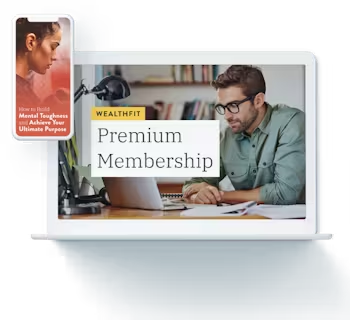Do you have trouble spending less than you actually earn? Are you saving or investing you money? If not, you’re not alone: a recent study found that nearly half of Americans spend all of the income they generate.
The same study revealed that only a little over a quarter of Americans are considered “financially healthy.”
That’s the bad news, but the good news is that many financial problems can be improved—yours included—ifif you’re willing to make a change.
To make that change, you’ll need the right information, a good plan, and potentially a helping hand. Keep reading for highlights on ways to get help with your finances, and possibly for free.
Online Advice
One place to begin your hunt for financial advice is online. There’s no shortage of websites offering free advice you can use to build a better financial plan, WealthFit included.

For example, you can take a free 90 minute WealthFit course called Wealth Building 101.
Aside from trusted sources, searching for money advice online can be challenging. Why? Because there’s so much of it, and you can easily become paralized by the sheer quantity of search results.
Here are two tips to help you cut through the noise to find what you really need to make a difference in your life when looking for answers online.
Identify Your Biggest Money Problems
Do you struggle with budgeting? If so, focus specifically on tools and apps that can help you solve that problem.

Are you struggling with too much debt? Search for specific content, courses, and guides to help you climb out of the hole.
Make A Plan
Look for online tools to help you set a goal and track your progress. Trying to pay off credit card debt? A free printable or spreadsheet can help you to stay motivated as you watch those weekly and monthly baby steps add up.

Remember to also be careful where you get free financial advice online. When you follow bad advice about money, it can be especially dangerous. Instead of solving your problems, it could do the opposite—make your situation worse.
Consumer Credit Counseling Service (CCCS)

Instead of looking online, do you want to sit down with a real person to go over your individual money situation?
If so, a non-profit consumer credit counseling service (CCCS) might be a good fit. Some of these companies offer (limited) free credit counseling services.
In general, a non-profit CCCS can help with:
To get started, you can schedule an initial counseling session, in person or over the phone. The session usually lasts around 30 minutes to 1 hour.
For many companies, the cost for this meeting is $0—hence the name free credit counselingfree credit counseling. But some do charge a fee; so be sure to ask up front.
Once you schedule an appointment, it’s important that you do your homework. You’ll need to prepare the information your counselor will need to review during your session. This may include:
There May Be a Cost
Be careful not to let the terms “non-profit” or “free credit counseling” fool you. Yes, free credit counseling exists.
Yet typically all of the services offered by a CCCS aren’t free. In general, debt management plans (DMPs), for which these companies are well known, have a cost.
Money Management International, for example, is accredited by the National Foundation for Credit Counseling (NFCC). The company charges both a set-up fee and a monthly fee for debt management services. Fees are calculated by your counselor during your session.
You should also use caution when choosing a credit counselor. If you talk to a counselor who immediately tries to push you toward a DMP without taking the time to review your financial situation, beware.
Debt management plans can be helpful for certain people, but a counselor should take the time to get familiar with your overall financial picture before recommending a DMP, or any other service with a fee attached to it.
Choosing the Right Credit Counseling Service
Think credit counseling may be right for you (either free credit counseling or fee-based services)? If so, it’s important to make sure you choose a reputable CCCS to represent you.
Here’s what the Federal Trade Commission says you should look for when you choose a CCCS:
Licensing
Is the company licensed to do business in your state?
Certification
Are the company’s employees trained by a trusted outside association (like the NFCC)?
Cost
What fees does the company charge? Are they willing to provide a quote in writing?
Affordability
Can you afford to pay the company’s fees? If a CCCS won’t help because you can’t afford to pay, search for help with someone else.
Your Local Credit Union or Bank

If you have a checking or savings account, your bank or credit union might have some free tools you can use to help with your finances. A few common examples include:
You may also be able to sit down with a banker, talk about your financial obstacles and goals, and get free advice.
Action Plan
Some banks and credit unions offer their customers a lot of extra financial tools; others don’t. If getting free financial help from your bank is an important perk to you:
A few banks that are known for their financial tools and/or advice include Ally, Bank of America, Chase, and Regions Bank.
Don’t Be Afraid to Ask for Help

Regardless of the reason for your financial stress, one thing is certain. Turning your finances back around isn’t easy.
That is why there’s zero shame in looking for help or asking someone for money advice. In fact, searching for help is smart.
Once you’ve made a new financial plan, remember not to look at it as a list of the things you can’t do anymore.
A good financial plan isn’t about doing without. It’s about sacrificing small things now so that you can afford the things that really do matter to you down the road.













